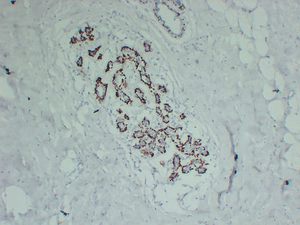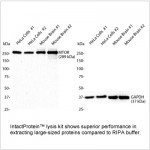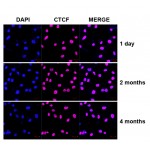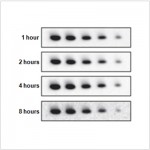| Reactivity: | H |
| Applications: | IHC/IF |
| Host Species: | Mouse |
| Clonality: | Monoclonal |
| Gene Name: | Tumor protein 63 (p63) (Chronic ulcerative stomatitis protein) (CUSP) (Keratinocyte transcription factor KET) (Transformation-related protein 63) (TP63) (Tumor protein p73-like) (p73L) (p40) (p51) |
Gene ID: | 8626 |
Immunogen: | Synthesized peptide derived from human p63 |
Uniprot ID: | Q9H3D4 |
Source: | Mouse/IgG1, Kappa |
Concentration: | 1 mg/ml |
Purity: | The antibody was affinity-purified from mouse ascites by affinity-chromatography using specific immunogen. |
Product Usage Information
IHC/IF | Human | 1: 200-1: 500 | breast |
Background
tumor protein p63(TP63) Homo sapiens This gene encodes a member of the p53 family of transcription factors. The functional domains of p53 family proteins include an N-terminal transactivation domain, a central DNA-binding domain and an oligomerization domain. Alternative splicing of this gene and the use of alternative promoters results in multiple transcript variants encoding different isoforms that vary in their functional properties. These isoforms function during skin development and maintenance, adult stem/progenitor cell regulation, heart development and premature aging. Some isoforms have been found to protect the germline by eliminating oocytes or testicular germ cells that have suffered DNA damage. Mutations in this gene are associated with ectodermal dysplasia, and cleft lip/palate syndrome 3 (EEC3); split-hand/foot malformation 4 (SHFM4); ankyloblepharon-ectodermal defects-cleft lip/palate; ADULT syndrome (acro-dermato-ungual-lacrim
Images
|
Immunohistochemistry analysis of paraffin embedded human breast using p63 (GB14129) at dilution of 1: 200 |
Storage
| Storage | Store at -20°C for one year. Avoid repeated freeze/thaw cycles. |
| Storage Buffer | Liquid in PBS containing 50% glycerol, 0.5% BSA and 0.02% sodium azide. |




